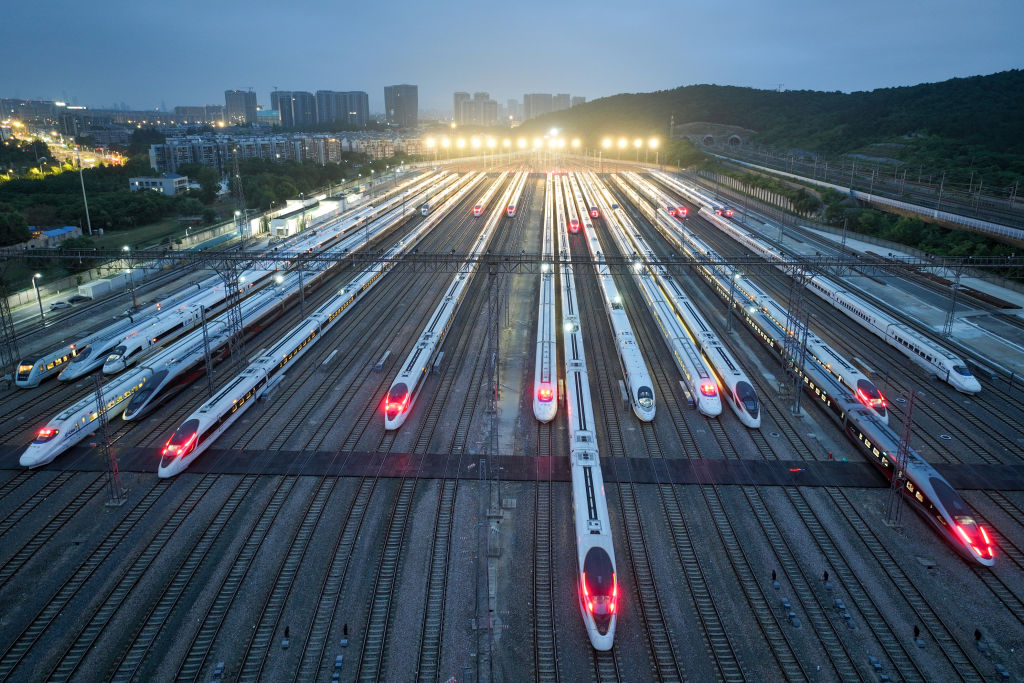Hey,
I’ve always wanted to visit Morocco, and not just to thank it for being the first country to recognize the United States of America. I like fez hats and old cities. ‘Nuff said.
But Morocco has problems, starting with corruption. Among the 180 countries scored by Transparency International, it’s squarely in the meaty part of the bell curve—at 97. It’s just slightly more corrupt than India, Lesotho, and the Maldives and slightly less than Argentina, Albania, and Belarus. Such rankings are more art than science and these distinctions are pretty fine. I mean, anyone looking to do business in Morocco who is concerned about corruption won’t have their fears allayed with the assurance, “Hey, we’re marginally less corrupt than Belarus and Albania.” But we’ll be coming back to that in a moment.
The country is in a bit of a pickle of late because Morocco’s economy is largely run out of the royal court, and since 2018, King Mohammed VI has all but vanished thanks to a bromance he’s struck up with Abu Azaitar, a German MMA fighter, who did a three-year stint in prison for brutally beating up a businessman. Azaitar, along with his brothers, monopolize the king’s time and benefit handsomely from his largesse. “They use military jets, they have carte blanche to function in the palace as they want, they can go to the garage and pick up the cars they want,” a royal insider told The Economist.
This isn’t super-relevant, it’s just interesting, like the fact that the symbol of love in Morocco isn’t the heart, but the liver. Given the role that the liver plays in drinking, there’s a certain logic to this. Alcohol is notoriously unreliable in the quest for Miss Right, but it is a storied matchmaker in the quest for Miss Right Now. Still, I find the idea of liver-shaped boxes of chocolate to be hard to get my head around. In fairness though, some claim that the familiar “valentine” heart symbol is derived from the netherly shape of a woman bending over. So it’s possible that the symbol of love—outside of Morocco, that is—is really an ass. So, who are we to judge? The liver wants what the liver wants.
Anyway, I bring up Morocco because around the time the king started dotting the eyes in “Azaitar” with little livers, Morocco debuted its high-speed rail system, the al Boraq. Morocco announced that construction would begin in 2008, but delays in financing pushed back construction until 2011, when the French rail company SNCF was brought in to expedite the project.
SNCF made the decision to work in Morocco after years of frustration in an even more opaque and confusing realm: California (the “C” is pronounced with a “K” sound). It wanted the contract to build California’s bullet train, but it found that dealing with California’s politicians and bureaucrats was maddening. “There were so many things that went wrong,” a veteran project manager told The New York Times in 2022. “SNCF was very angry. They told the state they were leaving for North Africa, which was less politically dysfunctional.”
Seven years later, Morocco has a bullet train. California still has bupkis.
Now, I am not known for celebrating the wisdom of French retreats, but in this case the French were right.
Rails to nowhere.
In 2008, voters in California approved the high-speed rail project. It was perfectly timed with the incoming Obama administration’s agenda of transforming America. It started pouring shmundo into what would become the administration’s “signature transportation project”—13 high-speed rail corridors across the country. “That investment is how we can break ground across the country, putting people to work building high-speed rail lines,” Obama explained, “because there’s no reason why Europe or China should have the fastest trains when we can build them right here in America.” This was back in the days when the Obama-Biden administration was insisting the country was strewn with “shovel-ready jobs.”
If you define high speed as exceeding 150 mph, America has exactly one such corridor, the Acela. But this designation would be generous since—in the entire corridor from Washington, D.C., to Boston—it can only reach these speeds on one 50-mile stretch. The initial price tag for California’s high-speed rail system, for the 500 miles between San Francisco and Los Angeles was supposed to be $35 billion. The project is now estimated to be $128 billion, and the state is $100 billion short. Estimates for the 171-mile “starter segment” in Central California alone are now about $35 billion.
Now, I like the idea of America having high-speed trains. You could even say, in Berber-accented Arabic, “I Liver High Speed Trains.” I also think it’d be cool to have moving sidewalks, flying cars, and giant playpens of basset hound puppies in the waiting areas of airports. I even think bullet trains make some sense in some places. The Houston to Dallas corridor is one such place, because it’s very flat (every foot of elevation costs kazillions when constructing high speed tracks) and sparsely populated. Population density matters because NIMBYism is the most expensive factor for such projects. Florida is very flat, but good luck getting all those densely populated counties to greenlight a bullet train barreling through them. My main objection to high-speed rail in the U.S. isn’t that I love trains so much—I want to savor the experience by riding them slowly. It’s that America already has a fantastic rail system for moving stuff. Our freight system is “universally recognized in the industry as the best in the world,” according to The Economist. In America, which is very big and demographically sprawling, we move stuff by rail and people by vehicles. In Europe, they tend to do it the other way around.
Administrative entropy.
But I didn’t start this “news”letter with the aim of writing about trains, transportation, or even infrastructure. I want to write about government, or really, governing. Corrupt political systems have an upside. The king of Morocco really wanted a bullet train. Once he figured out how to pay for it, there really wasn’t much standing in his way. Think of it this way, red tape in Morocco is probably a big problem for most people. But if you’re a German MMA fighter and the king likes your musk, red tape isn’t much of a problem. Just walk onto a military base and borrow a plane. You might not even need to fill out a form or leave a deposit.
In political philosophy this is the appeal of the philosopher-king. Frederick the Great was the poster boy of “enlightened absolutism.” Of course, the idea would be that the “enlightened” part would guide the “absolutism” part. Frederick the Great worked like a dog for his people, waking every morning predawn to go over the books. King Mohammed, on the other hand, spends 200 days a year at his beach pad in Gabon or in places like Paris sparring with his MMA pals.
In the West, the dream of enlightened monarchical absolutism gave way to technocratic absolutism. Hence all the man-crushes Western intellectuals of the 19th, 20th, and 21st centuries had for everyone from Otto von Bismarck to Mussolini, Stalin, Lee Kuan Yew, and the Chinese Communist Party. In America, the progressives—who envied the “efficiency” of autocracy and authoritarianism—set up a system of administrative law which they believed would empower cadres and castes of “disinterested” experts to pursue optimal policies without much heed to traditional concepts of the rule of law, separation of powers, or democratic accountability. They were hugely successful in setting up the system they wanted, but that system is what Public Choice Theorists would describe as a “hot mess.”
The way I see it, the vast system of bureaucratic agencies and the government workers who populate them, along with the countless special interests including unions, environmental groups, trial lawyers, and people named Todd, have become a class. This is not a new idea. I am a bit obsessed with the intellectual history of what used to be called the “new class.” I won’t get in the weeds here, but the basic idea is that the modern state and the modern economy created, well, a new class of workers, intellectuals, bureaucrats, etc. Different thinkers had different groups in mind for who made up the new class, depending on the societies they were writing about and the time they were writing in. The easiest place to grasp the idea is the Soviet Union. The Communist Party, as designed by Lenin, was above and separate from the government, the military, the church, the media, and the economy generally. It was, to use terms considered archaic by these scientific socialists, a priesthood and an aristocracy all at once. As political theorist Max Shactman put it, the Communist Party “is unique, in that it does not own the national property which it rules but does ‘own’ the state. It derives its vast economic power and privilege exclusively from the political power it exercises through its chosen instrument, the Communist Party.”
James Burnham had a wider lens. The philosopher wouldn’t have disagreed with that description of the Soviet Union, but he believed there was a worldwide revolution in political economy in which the “managerial elite” was becoming a recognizable class everywhere. The ruling classes in the Soviet Union and Nazi Germany ruled by bureaucratic fiat, but so did the new administrative state in New Deal America. “‘Laws’ today in the United States, in fact most laws, are not being made any longer by Congress,” Burnham wrote in his book The Managerial Revolution, “but by the NLRB, SEC, ICC, AAA, TVA, FTC, FCC, the Office of Production Management (what a revealing title!), and the other leading ‘executive agencies.’” Burnham’s book had been influenced by fellow theorist Bruno Rizzi’s book The Bureaucratization of the World (though it’s more accurate to say he was influenced by Trotsky’s outraged response to the book). George Orwell’s 1984 was directly inspired by The Managerial Revolution.
Okay, enough of all that. The relevance of this eggheadery is that we now have a system of government that is not government per se. The best you can say about public sector unions is that they have a dual mission: the stuff we think of as their jobs—teaching, policing, road-building, paper-pushing, safety inspections, whatever—and protecting their fiefdoms and privileges. This was put on stark display during the pandemic when teachers’ unions had a choice between their two missions and decisively chose the latter. One of the reasons the D.C. economy is such a mess is that the Biden administration is terrified of telling government agencies that the era of telecommuting needs to end now that the pandemic is over.
Then there’s the fact that government workers have in effect lifelong tenure (a point often left out of calculations about their total compensation). I haven’t been able to find recent numbers, but in 2011, the top driver of job turnover at many government agencies wasn’t firing or lay-offs, but death by natural causes. In 2013, the firing rate of government employees was .47—not surprising given that it takes between six months and a little over a year to fire a federal employee. I’m not trying to put undue blame on the workers. The point is that these rules speak to the fact that the mission of their bosses—union bosses and government bosses alike—isn’t necessarily the work. Red tape is a problem, but red tape isn’t just a function of petty-mindedness. If your job is to grant permits, the incentives to make permitting complicated and expensive are enormous. If getting a permit is simple and easy, why have the permitting process in the first place? The complexity of the process is what justifies the existence of the process—and the processors—in the first place.
The Biden administration’s biggest stumbling block in getting electric vehicle charging stations built is that it cannot get permits quickly. It’s amazing how if you oppose funding for electric car infrastructure you hear a lot of shrieks about an “existential crisis” and how there’s no time to waste. You don’t hear nearly as much shrieking about the sometimes years-long permitting process.
These are just some of the facets of what writer Jonathan Rauch, drawing on Mancur Olson’s work, dubbed “demosclerosis,” the artery-hardening of the body politic. It took 410 days to build the Empire State Building beginning in 1930; four years to erect the Golden Gate Bridge a few years later. The Pentagon took 16 months in the early ‘40s; the Alaska Highway just nine months in 1942. Meanwhile, Boston’s Big Dig, from planning to completion, took more than 24 years. California’s high-speed rail, if it’s ever completed, might take twice as long. Deny it all you want somewhere in the system, those delays aren’t considered bugs, but features.
I am a huge fan of Rauch and Olson’s work, and I think it has massive explanatory value. But I think there’s another part of the explanation. This system, defended by the new class and given legalistic legitimacy by the administrative state, is a kind of second government. I’d call it the “deep state” but I don’t want to encourage the jabroneys who love to talk about the deep state like it’s Hydra or an extension of the Biden Crime Family.
The first problem with this second government is that it doesn’t govern well. And the reason for that is ancient. As I wrote in Suicide of the West, it’s really an ancient form of government more similar to feudal aristocratic and guild systems than we moderns want to acknowledge or even see.
But the primary problem with the second government is that it is unaccountable.
Yuval Levin’s wonderful new book American Covenant gets to the heart of a lot of this. The system set up by the Founders is about governing, administration, and getting things done that voters want done. It has mechanisms for holding elected officials accountable in no small part because it puts elected officials in charge of getting things done. In a world of competitive elections, leaders have to keep on their toes like Robert Reich at a urinal. Congress and state legislatures are supposed to be the places where elected representatives hash out what is to be done and at what cost. They do very little of that now because over the last century they have handed the keys to the actual government to largely unfireable and invisible administrators with conflicting missions. The administrators’ constituencies aren’t primarily the public, the voters, or the taxpayers, but their own workers and the special interests most concerned with maintaining the status quo. This hybrid system elects people merely to nudge the managerial class in one direction or another—and poorly at that. To the extent we elect people to govern, we elect them to push for more funding for this bureaucracy or that one. We don’t elect anybody to actually run the bureaucracies, which thanks to old growth jungles of administrative law, are essentially on auto-pilot anyway.
One of Yuval’s core points is that our political system was set up to be competitive. Competition, between candidates, parties, branches of government, and even litigants in a court of law, is how we discover best practices and satisfy the desires of voters. But in Washington and in places like California, the actual people running the government have protected themselves from the competitive system established by the Founders.
This was by design. It was what Woodrow Wilson and his crowd wanted. They thought they were inventing a new, better, form of government that took politics out of governing. But go back to Aristotle: How to govern is politics. We still have politics, of course. Politics is a permanent feature of any community larger than a hermit. But the politics we have aren’t new, or even newer than the “science of politics” envisioned by the Founders. They’re older. They’re the politics of guilds, priesthoods, aristocrats, mandarins, Roman equestrians, and other unelected “stakeholders” in static, sclerotic, systems.
The frustrating thing for me is that the ambitions of our politicians have become ever more grandiose—Fundamental Transformation of America! Make America Great Again!—even as their ability to do the basics of governing has atrophied. You want high-speed rail? Fine, let’s have high-speed rail. But don’t lie about the cost or the returns for the environment or the economy when you do so. But more importantly don’t promise high-speed rail—never mind the fundamental transformation of America or the restoration of America’s soul, or world historic greatness—when you can’t even manage to do the things we all agree government is for. If the political class was just killing it delivering excellent schools, fighting crime, maintaining roads, balancing the books, etc. I’d be much more open to saying, “Well done! Let’s see what else you can do.” But when you can’t do that stuff well, don’t come to me with promises of a Green New Deal or socialized medicine.
Demosclerosis is a form of authentic corruption. Not the corruption of bribery and graft, or kings flattered by MMA bros. It’s the atrophy, decay, and retreat into the self-dealing of unaccountable elites that, from time immemorial, sees the people as resources to be exploited, not citizens to be served. And the cure for it isn’t to move past the constitutional vision of the Founders. It’s to restore it.










Please note that we at The Dispatch hold ourselves, our work, and our commenters to a higher standard than other places on the internet. We welcome comments that foster genuine debate or discussion—including comments critical of us or our work—but responses that include ad hominem attacks on fellow Dispatch members or are intended to stoke fear and anger may be moderated.
With your membership, you only have the ability to comment on The Morning Dispatch articles. Consider upgrading to join the conversation everywhere.